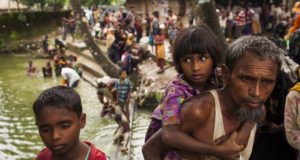In a major development for the Rohingya justice movement, two soldiers of the Myanmar army have provided damning video testimony that they were directed to “shoot all you see and all you hear” by their superiors. In addition to confessing to their participation in a litany of violations, including rape, executions, the decimation of villages, and burying bodies in mass graves, the soldiers described directives to slay all Rohingya in their sight, including children. Significantly, the men detailed near-identical commands to exterminate, despite serving under different commanders in two different townships.
Call it Genocide, sign the petition today
It is unclear whether the two privates, named Myo Win Tun and Zaw Naing Tun, will face trial at the ICC, provide testimony, or receive witness protection. Whatever role they play moving forward, the information they have provided marks a watershed moment in the fight for justice for the Rohingya. The United States cannot stand idly by in the face of such damning evidence of genocidal intent. This tipping point cannot be ignored. The State Department must finally answer the rallying cry and call it genocide. Please take a moment to sign this petition asking Secretary of State Mike Pompeo to make a genocide designation for the Rohingya.
This marks the first time that members of the Myanmar military, known as the Tatmadaw, have offered clear evidence of a unified and coordinated policy to indiscriminately wipe out the Rohingya. Their open confessions of genocidal directives coming down the chain of command could be a game-changer for justice processes currently underway at the International Criminal Court and the International Court of Justice.
It is incumbent upon the Trump Administration to stand up in the face of such a breakthrough and finally call what happened to the Rohingya by its rightful name: genocide. The U.S. Senate must also revive and swiftly pass the Burma Human Rights and Freedom Act, which has been suppressed for far too long.
What distinguishes genocide from all other mass atrocity crimes is the intent requirement — specifically, the intent to destroy a protected group, in whole or in part. It’s not enough to perpetrate violence with discriminatory animus; the perpetrator must operate with the explicit desire to wipe the human slate clean of a group simply because of who they are or what they believe. While some architects of genocide have been very vocal about their plans, such as the Nazis or the Hutu Power movement, they are the anomaly rather than the rule. Most perpetrators of genocide will go out of their way to deny the atrocities they’ve unleashed; airtight denial is often a telltale stage of genocide.
In the absence of clear proclamations of genocidal plans, intent can be inferred from conduct: the systematic or coordinated nature of the attacks; evidence of premeditation or planning; the scale and brutality of the violations; the indiscriminate nature of the violence; and, even, large-scale public propaganda campaigns. In the case of the Rohingya genocide, all of these indicators were present and have been corroborated by refugees who fled annihilation in August 2017, satellite images, and even Facebook accounts, where much of the propagandizing took place.
All of this was more than enough for many to designate the atrocities perpetrated against the Rohingya a genocide — including Jewish World Watch, the United States Holocaust Memorial Museum, and the United Nations. However, proving genocide in a court of law is a tall order, and the soldiers’ testimonies offer precisely the type of clear-cut expressions of intent that could tip the scales of justice in favor of the Rohingya.
The two soldiers have been taken to The Hague, where they are currently in the custody of the International Criminal Court, which is investigating atrocities perpetrated against the Rohingya. The International Court of Justice (ICJ) also in The Hague, is considering the Rohingya genocide in a separate case filed by the Gambia, and recently joined by several other countries, including the Maldives, Canada, and the Netherlands. In January, the ICJ ordered the government of Myanmar to take immediate steps to prevent future genocide against the Rohingya by issuing four provisional measures to protect the persecuted group during the pendency of the litigation. Over 1 million Rohingya live in squalid, overcrowded camps in Bangladesh after fleeing their homeland in one of the greatest mass exoduses in human history. Those 600,000 Rohingya who remain in Myanmar are trapped in an apartheid system of total rights deprivation, cut off from the outside world and struggling to survive amidst an ongoing armed conflict replete with war crimes and mounting civilian casualties.
We are continuing our vital work in the Rohingya camps in Bangladesh in the face of COVID-19. Please visit our marketplace to support these efforts.
[maxbutton id=”92″]
Call upon the Senate
The soldiers’ testimony is so unprecedented and powerful that it will propel efforts to secure accountability, and this should start here in the United States. It is imperative that the Senate finally takes up the Burma Human Rights and Freedom Act (S. 1186). The House has passed this legislation multiple times, but it has thus far been buried in the Senate and has not made it to the floor. It is upon us to get our senators to pay attention and pressure others to support the passage of this crucial legislation, which would implement economic sanctions and visa bans against the architects of the genocide.
[maxbutton id=”32″]


